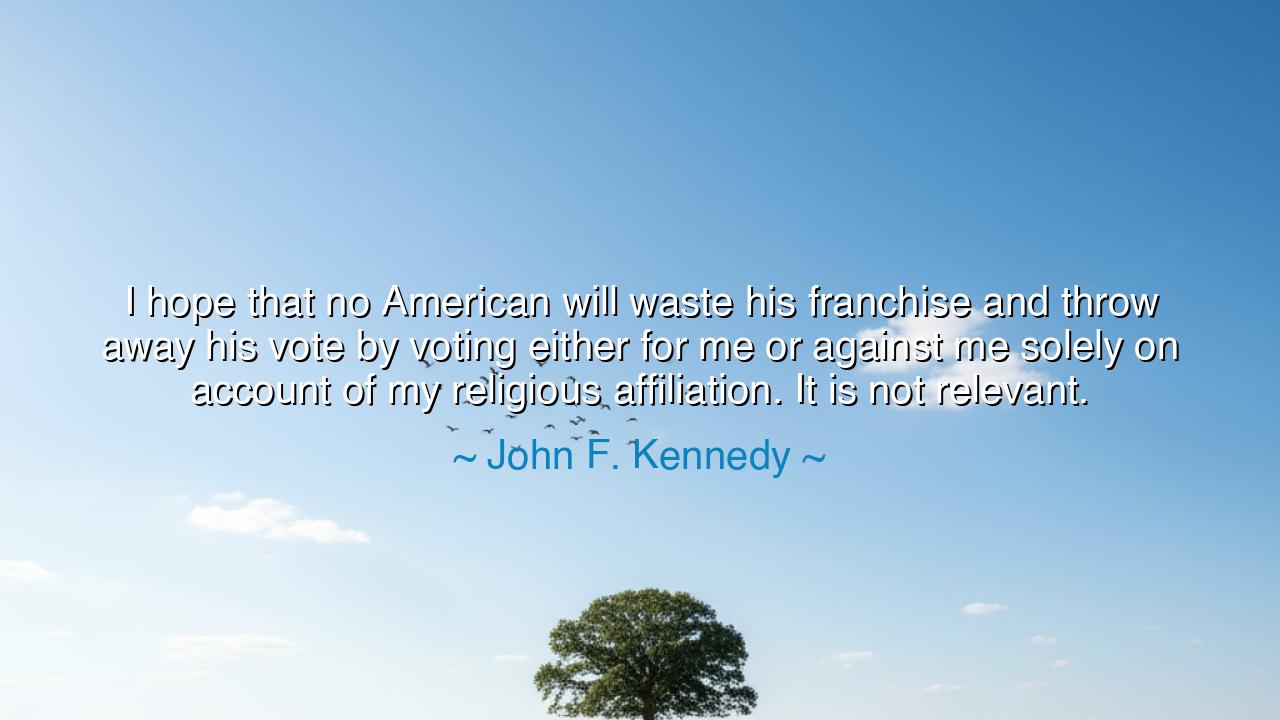
I hope that no American will waste his franchise and throw away
I hope that no American will waste his franchise and throw away his vote by voting either for me or against me solely on account of my religious affiliation. It is not relevant.






“I hope that no American will waste his franchise and throw away his vote by voting either for me or against me solely on account of my religious affiliation. It is not relevant.” Thus spoke John F. Kennedy, the young senator from Massachusetts, whose voice rose in 1960 above the storms of prejudice and fear. In these words, he did not merely defend himself—he defended the very soul of democracy. For Kennedy, faith was a private matter, while freedom was the sacred covenant of the people. To vote not with reason but with bias, he warned, was to betray that covenant, to wound the Republic at its heart. His words were both humble and defiant, the declaration of a man who believed that America’s greatness rested not upon the uniformity of its faiths, but upon the liberty of its conscience.
In the ancient style, we might say that Kennedy spoke as one of the guardians of the polis, reminding his people that the city’s strength lies in virtue and thought, not in the accidents of birth or creed. His quote arose from a moment of crisis: the first Catholic ever to stand on the threshold of the American presidency. The whispers of doubt filled the land—voices that claimed no man of his faith could truly serve the Constitution, that his loyalty might bend toward Rome rather than Washington. But Kennedy, standing before ministers in Houston, lifted his words like a shield of reason. He declared that he would be guided not by the dictates of the church, but by his oath to the nation. In doing so, he transformed suspicion into a moment of awakening, calling all citizens to remember that religion, while sacred in the soul, must never be a chain upon the state.
Through these words, Kennedy sought to separate faith from fear and citizenship from prejudice. He appealed to the conscience of America, saying that to judge a man’s worth by his church was to undo the very work of the Founders. For what, he asked, was the purpose of liberty if not to ensure that no person is denied the fruits of their labor or the respect of their neighbors because of what they believe? The vote, he reminded the people, is not a weapon to punish difference—it is a trust, given by freedom to reason, that each may weigh the fate of the nation with fairness and wisdom. To cast a vote out of hate or blind allegiance is to waste it, to turn the act of citizenship into folly.
This truth echoes far beyond Kennedy’s time. In every age, there are voices that seek to divide—the demagogues who tell the people that difference is danger, that unity must come from sameness, that fear is safer than understanding. But as the ancients taught, a republic built on fear is already falling. Kennedy’s words call us to the higher law of the spirit: that justice depends not on whom we worship, but on how we live; that the measure of a leader lies not in creed, but in character. His plea was not for tolerance alone, but for reason, that noblest of virtues which sees the person before the label, the deed before the dogma.
Consider how history has tested this ideal. When Abraham Lincoln rose to power, many doubted that a man from the rough soil of the frontier could lead a nation. When Barack Obama sought the presidency, others doubted that a man of his color could unite it. Yet in each of these moments, the Republic endured because enough hearts turned away from fear and chose principle over prejudice. Kennedy’s own victory in 1960 was such a moment—a sign that the walls of ignorance could indeed be broken, that the people, when reminded of their highest calling, could still rise above division. His triumph was not his alone; it was a victory for the idea that belief must never be a barrier to belonging.
But there is also a warning within his words. Kennedy spoke of the voter who wastes his franchise—a sin not of malice, but of neglect. To waste one’s vote, he said, is to treat lightly the sacred trust of democracy. Whether by apathy or by prejudice, the result is the same: the weakening of the republic. The ancients would call this a form of civic death, for a citizen who votes without thought, or not at all, has abandoned their duty to reason and to justice. Kennedy’s warning thus lives on: that democracy depends not only on the right to vote, but on the wisdom to use it rightly.
So, my child, take this lesson to heart: judge no person by their faith, but by their deeds. When you stand before the ballot or any decision that shapes the common good, cast away the noise of division. Remember that the purpose of your voice is not to exalt one tribe above another, but to uphold the dignity of all. Let your reason be clear, your heart steadfast, your mind open. For a nation is only as strong as the conscience of its people. And when you are tempted by prejudice or indifference, recall Kennedy’s plea: do not waste your franchise. Vote not as a follower of creed, but as a guardian of liberty. For in doing so, you honor not only the living, but the generations yet to come.






AAdministratorAdministrator
Welcome, honored guests. Please leave a comment, we will respond soon